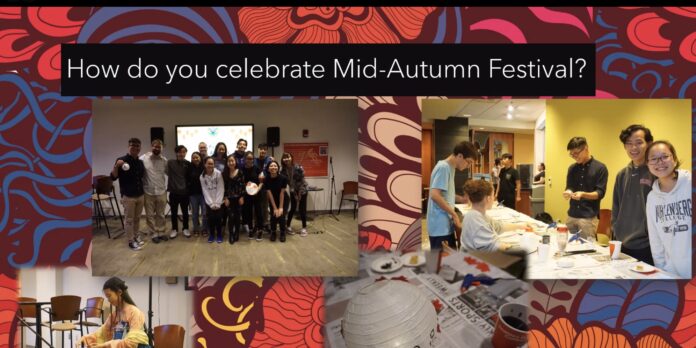On Thursday, October 8th, the Chinese Language Table, Asian Student Association (ASA), and the International Student Association (ISA) all joined together to hold a virtual celebration of the Mid-Autumn Festival. The Mid-Autumn Festival is an important holiday for the Asian community and is a time usually spent with friends and family. However, with the current pandemic and restrictions on travel across the world, the festival looked different this year. Despite this, the virtual celebration was still a success because it was a welcoming and engaging environment for people to share their experiences and their families’ traditions. Plus, an even stronger bond was created since mooncakes were delivered to attendees joining the celebration. Over 40 mooncakes were packaged and delivered by a joint effort of the three groups, allowing for a delicious treat. 21 participants attended the event, including faculty, professors, alumni, and students. Dr. Casey Miller, assistant professor of anthropology, led the flow of the event and while other presenters filled the space, ending with a moment for everyone to enjoy their delectable mooncakes.!
After virtual attendees met everyone and introduced themselves to the group, ASA co-president Vanessa Pham ‘21 presented a slideshow full of imagery that captured the holiday explaining what the Mid-Autumn Festival is and other key details, including popular foods. The festival begins on the 15th day of the eighth month, lasting for 3-7 days in various Asian countries. One slide also showcased previous celebrations of the holiday by ASA, showcasing a wide variety of activities that informed and united students when on campus in the past. For example, one picture showcased a table with different supplies to create and customize lanterns with calligraphy where guests could take home a decoration of their experience, as mentioned by Robin Chodak ‘22. Even though this same level of interaction and connection was not possible via Zoom, it was still a success for ASA and the other groups involved.
Following this presentation, faculty members then joined in the conversation and shared their experiences with the holiday. Dr. Lufei Teng, assistant professor of economics and finance at Muhlenberg, shared her personal experience and traditions. Dr. Teng is originally from China and usually celebrates this holiday by traveling back to her home country and spending time with her family. Dr. Teng highlighted how the current pandemic has resulted in her staying in America to celebrate the holiday. This is so impactful because of the role Family usually serves in this celebration; The Mid-Autumn Festival is more than just mooncakes and connection, it is along the lines of Thanksgiving in the United States. The holiday is usually a family reunion and a time where family members reunite and spend time with each other. According to Dr. Teng, the festival is the second biggest holiday for China after the Chinese New Year. Nancy Collins and Yishen Lai, part-time lecturers in Chinese, also mentioned their personal stories with the festival. Lai even discussed the meaty mooncakes which are popular in South China, a different take on the iconic food.
The participants of the virtual event were put to the test with a Kahoot focusing on various questions and elements from the presentations and conversations. Kahoot is a modern trivia application which is utilized in educational settings, events, and even parties to question a person’s knowledge and have fun during the process. It was highly competitive and allowed for attendees to showcase their knowledge. For example, one question asked what the festival revolves around, the correct answer being the moon. This question focuses on the fact that the moon is brightest during the lunar calendar when the Mid-Autumn Festival is celebrated. Other key questions revolved around the start date of the holiday, how long the celebration lasts, and alternate names (Mooncake Festival and Lantern Festival).
Dr. Tineke D’Haeseleer, assistant professor of history (East Asian history, mainly China), mentioned how the alternative name of “Lantern Festival” for the holiday baffled her since she thought it was related to a different celebration. The date when the celebration occurs also caused a bit of confusion for Dr. D’Haeseleer because of the similarity to a different holiday’s date. Dr. D’Haeseleer even joked how she ate her mooncake during the Kahoot out of stress. The Kahoot allowed for everyone to reflect on the Mid-Autumn Festival and what they learned or already knew.
Then with mooncakes in hand, the conversation switched to other important traditions and even how a turkey can be cooked. This was brought up because mooncakes can be prepared in different ways and with different ingredients depending on the region, similar to how turkeys are cooked in various ways throughout the United States during Thanksgiving. This highlighted another similarity of Thanksgiving and the Mid-Autumn Festival and what makes them alike. Another topic was the unhealthiness of mooncakes and when they are available. Mooncakes are mainly eaten during the holiday because they are loaded with sugar, but are available all year round.
Overall, the virtual celebration of the Mid-Autumn Festival hosted by ASA, ISA, and the Chinese Language Table provided a unique and descriptive view of the Asian holiday. The mooncakes delivered to attendees made the interaction more personal and the stories, Kahoot, and presentations were informative and fun. Tom Janis, Director of International Support, and Dr. Casey Miller were extremely important in helping the ASA and in making sure they had a successful event. Looking ahead, the Chinese Language Table has more events planned so feel free to attend their next meeting which will discuss food and a variety of dishes.






















